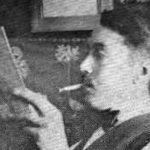There was once a little animal,
No bigger than a fox,
And on five toes he scampered
Over Tertiary rocks.
They called him Eohippus,
And they called him very small,
And they thought him of no value --
When they thought of him at all;
For the lumpish old Dinoceras
And Coryphodon so slow
Were the heavy aristocracy
In days of long ago.
Said the little Eohippus,
“I am going to be a horse!
And on my middle finger-nails
To run my earthly course!
I’m going to have a flowing tail!
I’m going to have a mane!
I’m going to stand fourteen hands high
On the psychozoic plain!”
The Coryphodon was horrified,
The Dinoceras was shocked;
And they chased young Eohippus,
But he skipped away and mocked.
Then they laughed enormous laughter,
And they groaned enormous groans.
And they bade young Eohippus
Go view his father’s bones.
Said they, “You always were as small
And mean as now we see,
And that’s conclusive evidence
That you’re always going to be.
What! Be a great, tall, handsome beast,
With hoofs to gallop on?
Said the Loxolophodon.
They considered him disposed of,
And retired with gait serene;
That was the way they argued
In “the early Eocene”.
There was once an Anthropoidal Ape,
Far smarter than the rest,
And everything that they could do
He always did the best;
So they naturally disliked him
And they gave him shoulders cool,
And when they had to mention him
They said he was a fool.
Cried this pretentious Ape one day,
“I’m going to be a man!
And stand upright, and hunt, and fight,
And conquer all I can!
I’m going to cut down forest trees,
To make my houses higher!
I’m going to kill the Mastodon!
I’m going to make a fire!”
Loud screamed the Anthropoidal Apes
With laughter wild and gay;
They tried to catch that boastful one,
But he always got away.
So they yelled at him in chorus,
Which he minded not a whit;
And they pelted him with cocoanuts,
Which didn’t seem to hit.
And then they gave him reasons
Which they thought of much avail,
To prove how his preposterous
Attempt was sure to fail.
Said the sages, “In the first place,
The thing cannot be done!
And, second, if it could be,
It would not be any fun!
And, third, and most conclusive,
And admitting no reply,
You would have to change your nature!
We should like to see you try!”
They chuckled then triumphantly,
These lean and hairy shapes,
For these things passed as arguments
With the Anthropoidal Apes.
There was once a Neolithic Man,
An enterprising wight,
Who made his chopping implements
Unusually bright.
Unusually clever he,
Unusually brave,
And he drew delightful Mammoths
On the borders of his cave.
To his Neolithic neighbours,
Who were startled and surprised,
Said he, “My friends, in course of time,
We shall be civilized!
We are going to live in cities!
We are going to fight in wars!
We are going to eat three times a day
Without the natural cause!
We are going to turn life upside down
About a thing called gold!
We are going to want the earth, and take
As much as we can hold!
We are going to wear great piles of stuff
Outside our proper skins!
We are going to have Diseases!
And Accomplishments!! And Sins!!!”
Then they all rose up in fury
Against their boastful friend,
For prehistoric patience
Cometh quickly to an end.
Said one, “This is chimerical!
Utopian! Absurd!”
Said another, “What a stupid life!
Too dull, upon my word!”
Cried all, Before such things can come,
You idiotic child,
You must alter Human Nature!”
And they all sat back and smiled.
Thought they, “An answer to that last
It will be hard to find!”
It was a clinching argument
To the Neolithic Mind!



















Comment form: